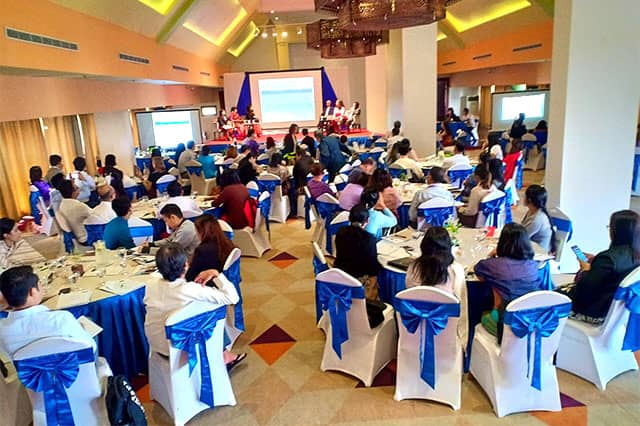Second Multi-Stakeholder Workshop on Promoting Employment Opportunities for Persons with Disabilities

Myanmar Centre for Responsible Business (MCRB), AAR Japan and the International Labour Organization (ILO), co-hosted second multi-stakeholder workshop on Promoting Employment Opportunities for Persons with Disabilities on 6 and 7 March at Rose Garden Hotel, Yangon (see agenda in sidebar). The first forum was held in November 2017.
The workshop was part of a joint action by the European Union, the ILO and the OECD on responsible supply chains in six countries in Asia, including Myanmar, to promote responsible business conduct (RBC) with regard to decent work, environmental sustainability and respect for human rights, and was also supported by JICA and MCRB’s core funders.
Over 110 participants attended from government, business, and civil society groups working for the rights of people with disabilities, as well as international experts. A press release for the workshop is available in English and Burmese (see sidebar).
In his opening speech, Permanent Secretary of the Ministry of Labour, Immigration and Population, U Myo Aung outlined government activities since the first forum, including the adoption in December 2017 of the Rules to implement the 2015 Law Protecting the Rights of Persons with Disabilities. He explained that eight sub-committees had recently been formed to support the work of the National Committee, including one dedicated to Employment, for which the input of employers was essential, including through the participation of the Union of Myanmar Federation of Chambers of Commerce and Industry (UMFCCI).
Director-General of the Department of Rehabilitation in the Ministry of Social Welfare, Relief and Resettlement (MSWRR), U Win Naing Tun described the activities which the Ministry was coordinating across government so that Myanmar could fulfil its commitment to disability-inclusive development under the November 2018 ASEAN Enabling Masterplan 2025 on Mainstreaming the Rights of Persons with Disabilities.
U Thein Lwin, Acting Chairman of MFPD underlined that persons with disabilities needed jobs, to ensure that they could make use of their hard-won education. He called on the government to accelerate the implementation of the 2015 Law by establishing a registration process for persons with disabilities. He also encouraged the Sub-Committee on Employment to provide advice to the National Committee on setting a percentage quota for employment of people with disabilities, as is provided for in the law.
U Win Naing, Deputy Chair of the Myanmar Industries Association, and representing UMFCCI, highlighted that disability inclusion was a new concept for most Myanmar companies. However UMFCCI recognised the national importance and was committed to ensuring that the country ,made the most of the ability of persons with disabilities. Businesses were looking for guidance and support on how to do this, as well as clarity from government on issues such as registration.
Jane Cordell, Director of Result CIC, a UK social enterprise which coaches and trains people with disabilities, and the organisations which employ them, shared her personal experience in a keynote speech. As a professional musician she became deaf in her mid-20s, but had since pursued a career as a language teacher, diplomat and business coach. She explained that the UK’s 2010 Equality Act legally protects people with disabilities from being discriminated against in the workplace and in wider society. She also outlined the incentives available, such as the Access to Work, a UK government fund which gives discretionary grants to disabled people in paid work, for example to help them with assistive technology. She noted that this is ‘net positive’ for government finances: studies show that $1 of grant leads to disabled people paying $1.50 more income tax due to increased earnings. She also highlighted how businesses could be proactive about recruitment, for example by guaranteeing an interview to any job applicant with a disability who meets the minimum requirements for the job.
To meet Myanmar companies’ need for guidance, the workshop discussed establishing a ‘Myanmar Business Disability Network’, a business- led coalition where businesses could share good practice and push for positive change. Peter Fremlin, an external consultant to the ILO who has worked with the ILO's Global Business and Disability Network (GBDN) and some of the 28 existing national networks, and Murteza Khan, CEO of the Bangladesh BDN shared lessons learned from setting up business disability networks, and how they could be most useful to business.
The workshop also discussed initiatives and good practice concerning employment including job coaching, assistive technology and ‘reasonable accommodation’. Speakers from disability organisations and NGOs included representatives of Shwe Minthar Foundation, Myanmar Federation of Persons with Disabilities, MFPD, Myanmar Independent Living Initiative, Myanmar Deaf Community Development Association, AAR Japan, Japan Heart, Myanmar Physically Handicapped Association, BRAC Myanmar, and Leprosy Mission Myanmar. Business speakers included Mizzima Media Group, Yangon Bakehouse, Hla Day, Myanmar Apex Bank, Sule Shangri-La Hotel, Accor Hotels, and Mira Myanmar Travel.
The workshop was a chance for networking and an opportunity to raise disability awareness for a wider group of businesses, and in particular human resources managers, using the handbook: “Employing Persons with Disabilities” published in December 2018 by AAR Japan and MCRB with the support of the MSWRR and MFPD.
Read also
- Video on Disability from I Am Me
- Handbook for Employers on Employing Persons with Disabilities in Myanmar
- MCRB Promotes the Third Networking Event by MSMEs Led/Involved by Persons With Disabilities
- Bringing Assistive Technologies for B2C Services to Myanmar
- Discussing ‘Dignity By Design’ in Myanmar’s Built Environment
 English
English မြန်မာ
မြန်မာ မြန်မာ (unicode)
မြန်မာ (unicode)










